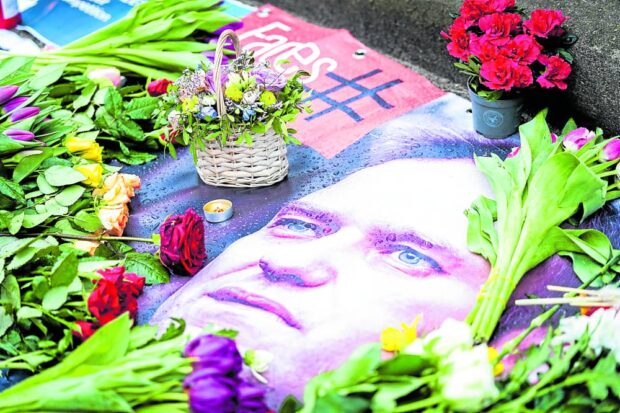
‘WE ARE NAVALNY’ Flowers lay next to a picture of the late Russian opposition leader during a protest on Friday in front of the Russian Embassy in Copenhagen following his death under controversial circumstances. —AFP
BERLIN—Supporters of Alexei Navalny turned out across Europe and in the United States on Friday to pay tribute to the man widely acknowledged as Russia’s main opposition figure.
The death of Navalny, 47, was announced earlier that day by officials in the Arctic prison where he was serving a 19-year sentence.
From New York and Washington to cities in western Europe to capitals of former Soviet bloc states, mourners showed their respect for the charismatic lawyer who rallied domestic opposition to the leadership of Russian President Vladimir Putin, including corruption under his rule.
Many were quick to blame Navalny’s death on the Russian leader.
“Putin murderer! Putin to the Hague!,” cried a crowd massed before Russia’s imposing embassy in Berlin—a reference to the Dutch city that hosts the International Criminal Court.
Most of the several hundred people gathered there were Russian speakers, many holding up posters of members of the opposition or slogans criticizing Putin.
“It’s a hard hit emotionally,” said Evgueni Syrokin, who coordinated the “Free Navalny” movement in Germany.
“It pushes us to continue to work, to struggle against Putin,” added the 43-year-old, bearing a black-and-white photo of the opposition figure.
In Moscow, small groups laid flowers at makeshift memorials, despite warnings by authorities.
Images on social media showed dozens of people lining up to place flowers at monuments to victims of political repression in Moscow and in St. Petersburg.
Authorities had warned people against heeding calls online “to take part in a mass rally in the center of Moscow.”
Mood in Russia
Protests are illegal in Russia under strict antidissent laws, and the government has clamped down harshly on rallies in support of Navalny.
Still, dozens laid red and white roses at Solovetsky Stone, a monument to victims of Soviet-era repression opposite the headquarters of Russia’s FSB security services—the former home of the feared Soviet secret police.
At least one person was detained for holding up a placard that appeared to say “murderers” on it, while a handful were pictured gathering to lay flowers at a bridge next to the Kremlin where Putin critic Boris Nemtsov was killed in 2015.
Police were filmed dispersing people who had gathered in the snow at a memorial in the central city of Kazan.
Some larger demonstrations also took place in the Georgian capital Tbilisi, Armenia’s capital Yerevan and Serbian capital Belgrade—which all host significant populations of Russians who fled the country following Moscow’s offensive on Ukraine.
In the Lithuanian capital of Vilnius, crowds gathered at a memorial to victims of the Soviet occupation.
“Even in prison he managed to find the force and give it to those who resist,” said one Russian resident of Vilnius who did not want to give his name.
Across Europe, United States
In Warsaw, about 100 people demonstrated outside the Russian Embassy, most of them young and visibly upset.
One 29-year-old Russian who only wanted to be identified as Denislan said he saw Navalny as a symbol of Russian civil society.
“I am here because Russia should and can become a democratic country,” he said.
In Switzerland, around 300 people attended an impromptu gathering outside Zurich’s train station, while more than 100 gathered in front of the United Nations in Geneva, carrying portraits of Navalny and white flowers.
In London, a few dozen gathered outside the Russian Embassy with signs in English and Russian saying “Putin assassin,” “Navalny is our hero” and “Putin go to hell.” Hundreds also gathered in Paris and Amsterdam to express support for Navalny.
In New York, people laid flowers outside Russia’s consulate and hung photos of Navalny on the gates. Several people held signs saying “Putin-Killer.”
Several hundred people, some bearing posters and candles, also gathered in front of the Russian Embassy in Washington, chanting “We are Navalny” and “Shame on Putin.” The words “Putin murderer” were projected on to the embassy building.
“I expected it, but it’s still so painful that he left us so early,” Maryam Henry, a 44-year-old teacher, told Agence France-Presse (AFP) outside the embassy.
“It’s such a tragic day. He was a symbol of freedom, bravery and resistance,” said a 29-year-old gymnastics coach who gave her name as Polina.
‘Make no mistake’
The shock announcement of Navalny’s death came a day before official campaigning for the March presidential election begins.
Critics say the election will be stage-managed to extend 71-year-old Putin’s two-decade hold on power.
Navalny, who was barred from challenging Putin in the 2018 presidential race, survived attempts to poison him two years later.
Following treatment in Germany, he returned to Russia in January 2021 and was immediately arrested. Last December, he was brought to Russia’s Arctic penal colony.
Russia’s federal penitentiary service said Navalny “felt bad after a walk, almost immediately losing consciousness.” Medics from a local hospital reportedly arrived within minutes and spent more than “half an hour” trying to resuscitate him.
Navalny’s wife, Yulia, said she held Putin personally responsible for her husband’s death and called on the international community to “unite and defeat this evil, terrifying regime.”
Putin—who famously never referred to Navalny by name—was on a visit to the Urals on Friday and made no mention of the death in his public appearance.
READ: Putin opponent Alexei Navalny dies in Arctic jail, Russia says
US President Joe Biden said on Friday: “Make no mistake. Putin is responsible for Navalny’s death.”
“We don’t know exactly what happened, but there is no doubt that the death of Navalny was a consequence of something that Putin and his thugs did,” he added.
Ukrainian President Volodymyr Zelenskyy, battling Russian forces for the past two years, said the Kremlin critic had been “killed by Putin.”
UN chief Antonio Guterres called for “a full, credible and transparent investigation.”